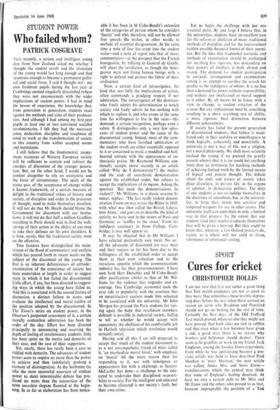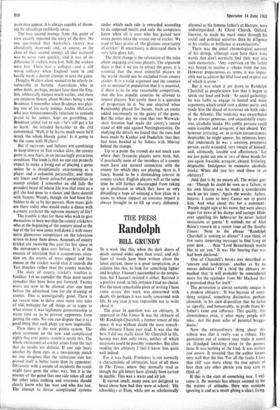Cures for cricket
SPORT CHRISTOPHER HOLLIS
I am not sure that it is not rather a good thing that Test match cricketers are not as good as they were. One remembers those terribly depres- sing days before the war when there seemed no reason on earth why Bradman and Ponsford should not go on batting for the rest of time. Certainly the first days of the Old Trafford Test match proved, whatever else they might not have proved, that both sides are rich in rabbits and that even when a few batsmen have given a side a good start there is no reason why bowlers and fieldsmen should despair. There seem to be gremlins at work on my friend, Jack Fingleton, among the Sunday Tunes copytakers. Even while he was apologising because a, pre- vious article was held to have described Paul Sheehan as `poor Sheehan,' the next article was calling Amiss Miss and Snow Enow- transliterations which the cynical may think that some of England's batting deserved. At least we owe a certain debt to Mr Miss and Mr Enow and the others who proved to us that, however impregnable the position of a Test
team may appear, it is always capable of throw- ing its advantage recklessly away.
The two second innings from this point of view exactly repeated the story of the first. No one questioned that Australia's victory was abundantly deserved; and, of course, at the close of their second innings all that mattered was to score runs quickly, and it was of in- difference if wickets were lost. Still, the wickets were lost. There was a collapse—and a still worse collapse when England went in and hardly made a decent attempt to save the game.
Douglas Walters alone seemed to be utterly in- vulnerable to fortune. Australians who in other fields, perhaps, mature later than the Eng- lish, athletically mature much earlier, and there are ominous threats about Walters being a new Bradman. I remember when Bradman was play- ing one of his early innings Archie McLaren, who was temperamentally reluctant to concede praise to his juniors, kept on grumbling, as Bradman added run to run—`he's still got a lot to learn.' An irritated bystander in the end commented, 'Well, if he learns much more he'll wreck the whole bloody game.' Is it going to be the same with Walters?
• But if successes and failures are combining to keep interest in Test cricket alive, the county game is, one fears, in an increasingly precarious condition. The truth is that no one can properly expect to make a living out of playing a game unless be is exceptionally entertaining as a player and a colourful personality, and there are fewer and fewer colourful personalities in county cricket. I remember an old lady the proudest boast of whose life was that once as a girl she had gone to a dance and there danced with Sammy Woods, though she had been for- bidden to do so by her parents. How many girls ate there today who would make a dance with a county cricketer the supreme memory of life?
The trouble is that for those who wish to give themselves to hero worship the county cricketers who at the beginning of the century stood at the top of the list now come well down it with many more glamorous competitors on the television screen to keep them down. Accounts of county cricket are receiving this year far less space in the newspapers than ever before. It is of the essence of television that it concentrates atten- tion on the events of mass appeal and this means in the cricket world that it records the Test matches rather than the county matches.
The story of county cricket's troubles is familiar. Let us consider the three most recent remedies that have been put forward. Twenty overs are now to be allowed after one hour before the advertised time for the drawing of stumps. This is unmitigatedly good. There is no reason now to delve once more into tales of old, unhappy far off things or to argue to what extent it was legitimate gamesmanship to waste time so as to prevent opponents from getting the runs. No one can dispute that it is a good thing that such ploys are now impossible.
Then there is the new points system. The plain comment on the new and complicated eighty-five over points system is surely this. The whole excitement of cricket arises from the fact that its results are definite. If one side beats another by three runs in a two-innings match no one imagines that the victorious side has proved itself a better team than its opponent. Obviously with a couple of accidents the result might have gone the other way, but it is the essence of the game that one side takes all and the other takes nothing and everyone should clearly know who has won and who has lost. The attempt to devise complicated systems
under which each side is rewarded according to its supposed merits and only the computers know when all is over who has gained how many points takes the savour out of cricket. We used to hear praise of 'the glorious uncertainty of cricket.' If uncertainty is destroyed there is very little glory left.
The third change is the relaxation of the rules about engaging overseas players. The argument there is that if we are to attract the gates, it is essential that the most colourful players in the world should not be excluded from county cricket. It is a valid argument and the counties are so unequal in population that it is essential, if there is to be any reasonable competition, that the less popular counties be allowed to import players. Yet surely there is a question of proportion in it. No one objected when Ranjitsinhji played for Sussex. Such an exotic added enormously to the gaiety of the game. But the other day we read that two Warwick- shire batsmen had made the county's record stand of 400 odd against Nottinghamshire. On studying the details we found that the runs had been made by Kanhai and Ibadullah. that they had been bowled at by Sobers with Murray behind the stumps.
Up to a paint the crowds do not much care where their favourite players were born, but, if practically none of the members of a county team have any natural connection with the county for which they are playing, there is, fancy, bound to be a diminishing interest in county cricket. English players will at the same time be still further discouraged from taking up a profession in which they have so very dwindling a hope of winning a firm place in a team,- to whose support an overseas import is always brought in to fill up every deficency.











































 Previous page
Previous page